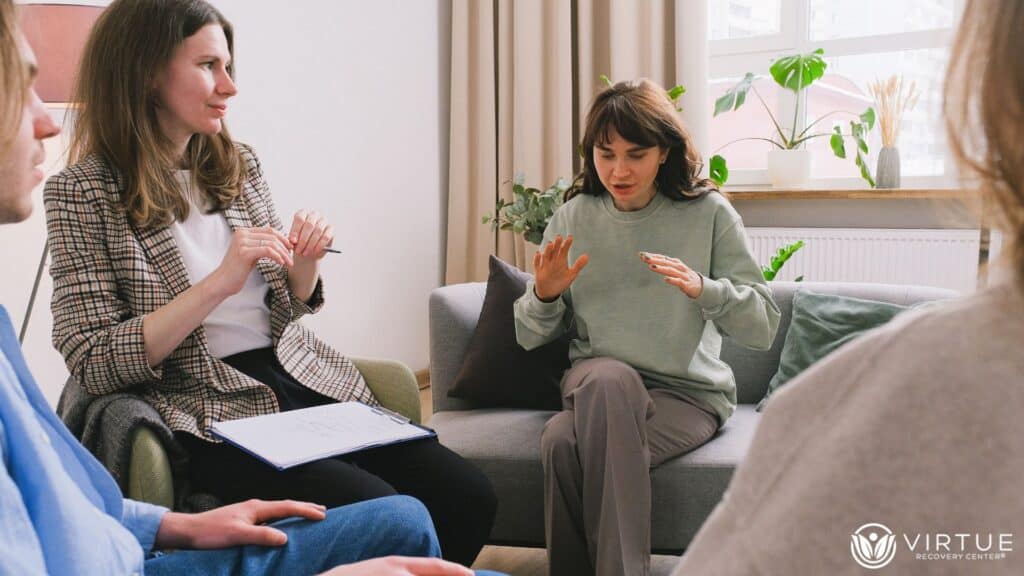
Table of Contents
Key Takeaways
- If you are hooked on mescaline, it can have a huge effect on your health in many ways.
- If you get help for your addiction early on, you are more likely to stay sober for a long period.
- Comprehensive treatment methods address concurrent substance use problems and mental health issues.
- Structured treatments, such as rigorous intensive outpatient programs and therapy, reduce the likelihood of relapse.
- Using behavioral support, counseling, and mindfulness together is better for long-term recovery.
What does it mean to be addicted to mescaline, and how does it happen?

Mescaline is a naturally occurring hallucinogen that can significantly alter perception, cognition, and behavior. Using drugs occasionally might not affect you right away, but prolonged use can lead to addiction and the development of a substance use disorder. People addicted to mescaline generally notice mood changes, poorer judgment, and problems maintaining professional and personal responsibilities.
Addiction develops due to a mix of genetic, psychological, and environmental factors. Individuals with trauma, untreated mental health issues, or other co-occurring challenges are at higher risk. People addicted to mescaline often experience anxiety, depression, or other mental health conditions, making recovery more difficult without proper care. Early access to professional addiction help is crucial. Resources such as Findtreatment.gov and research from PMC guide treatment options.
What forms of aid are available for individuals who struggle to stop using mescaline?
A thorough treatment plan combining multiple strategies is needed to address mescaline addiction. Behavioral therapy and personalized substance use disorder treatment are the foundation of recovery. These therapies help individuals understand the causes of their drug use and its effects on mental health. Programs may also incorporate holistic approaches, such as mindfulness and stress management, to enhance emotional resilience.
Intensive outpatient programs are suitable for individuals who need regular support but can still manage daily responsibilities. These programs provide structured schedules for therapy, counseling, education, and relapse prevention. For some, residential programs may also be a suitable option.
Learning about addiction is equally important. The Virtue Recovery Center addiction help page explains multiple treatment options, while the URMC guide on addiction offers research-based guidance for long-term recovery. These resources equip patients and families with the tools to manage substance use disorders effectively.
How does help with mental and behavioral health make recovery easier?
Recovery from mescaline addiction requires attention to both mental health services and behavioral health. Many individuals have co-occurring conditions such as depression, anxiety, or trauma-related disorders. Addressing these alongside substance use is vital for long-term success.
During therapy and counseling sessions, patients explore the underlying causes of addiction in a safe environment. Cognitive-behavioral therapy and other behavioral approaches teach coping strategies, help build healthy habits, and manage triggers. Mindfulness techniques enhance self-awareness and emotional regulation.
Digital tools complement in-person care. Educational playlists and video guides, such as the YouTube recovery playlist, offer ongoing support and practical strategies for patients and their families throughout the recovery process.
What are some things that help people stay clean and get better for a long time?
Relapse is common for people recovering from hallucinogen use. Structured recovery plans, including therapy, counseling, and support networks, reduce the risk of relapse. Programs that provide comprehensive care, address mental health, and involve family support have higher success rates.
Referral to specialized programs ensures continuity of care. Maintaining therapy sessions, practicing mindfulness, and adhering to an individual addiction treatment plan are key to sustained recovery. Support networks and professional guidance offer accountability, coping tools, and strategies to effectively manage triggers or high-risk situations.
How can those who are addicted get treatment and find the resources they need?

Accessing professional addiction help begins with a simple call or email. Virtue Recovery Center offers comprehensive assessments, personalized referrals, and a range of treatment options tailored to individual needs. National databases, such as Findtreatment.gov, help locate certified providers, while articles from PMC and URMC provide detailed, research-based guidance.
Patients are encouraged to explore various therapeutic options, including counseling, outpatient programs, and community support. Using multiple approaches alongside education and self-care increases the likelihood of long-term recovery.
Conclusion
Overcoming mescaline addiction requires a combination of structured treatment, behavioral health, and mental health services. Long-term recovery programs teach patients to manage substance use disorders, maintain sobriety, and develop effective coping strategies. Virtue Recovery Center offers comprehensive addiction help for individuals seeking personalized and structured care. Call 866-461-3339 today to begin the path toward a healthier, more lasting recovery.
FAQs
What are common symptoms of mescaline addiction?
Frequent use despite negative consequences, hallucinations, anxiety, social withdrawal, and poor judgment.
Can you help someone addicted to mescaline who also has mental health concerns?
Yes, effective recovery addresses both mental health and substance use disorders.
How effective are behavioral therapies for mescaline addiction?
Behavioral therapies help patients manage triggers, develop coping strategies, and reduce the risk of relapse.
How does mindfulness help in recovery?
Mindfulness improves emotional regulation, stress management, and awareness of triggers, supporting long-term recovery.
Is an intensive outpatient program suitable for everyone?
These programs are ideal for individuals who require structured support while still managing their daily responsibilities.
Resources
FindTreatment.gov. FindTreatment.gov, U.S. Department of Health & Human Services, https://findtreatment.gov/
“Addiction (Substance Use Disorder).” UR Medicine – Conditions & Treatments, University of Rochester Medical Center, https://www.urmc.rochester.edu/conditions-and-treatments/addiction
“Deep Brain Reorienting (DBR) as Intervention for Trauma and Addiction.” PMC, U.S. National Library of Medicine, National Center for Biotechnology Information, https://pmc.ncbi.nlm.nih.gov/articles/PMC10291338/
Are You Covered For Treatment?
At Virtue Recovery Center, we understand the importance of accessible care. That’s why we’re in-network with numerous private insurance companies, ensuring that your journey to recovery is supported from the start. Let us help you quickly and easily verify your insurance coverage. Begin your path to healing today.
- About the Author
- Latest Posts
Gigi Price( Clinical Director )
Gigi Price holds licenses as a Master Social Worker and Clinical Drug Counselor. She completed her master’s degree in Social Work at Texas State University. Over the last decade, Gigi has been dedicated to utilizing evidence-based practices to enhance patient care and treatment planning, resulting in positive, long-term outcomes for patients and their families. Her passion lies in creating a treatment environment where professionals collaborate to bring about positive change and provide a safe, trustworthy therapeutic experience. Patients can be confident in receiving top-quality care under her leadership.
In her role as the Clinical Director of Virtue Recovery Houston, Gigi conducted research to identify the most effective approaches for treating patients with acute mental health diagnoses, PTSD, and Substance Use Disorder. She then assembled a team of skilled clinicians who could offer various therapeutic modalities, such as Cognitive Behavioral Therapy (CBT), Dialectical Behavioral Therapy (DBT), Acceptance and Commitment Therapy (ACT), Somatic Exposure, Eye Movement Desensitization and Reprocessing (EMDR), and Cognitive Processing Therapy (CPT). Gigi takes pride in overseeing the development and implementation of Virtue Houston’s Treatment Program, which includes two specialized therapeutic curricula tailored to the unique needs of individuals struggling with mental health issues, addiction, and PTSD.
How Cognitive Behavioral Therapy Supports Lasting Sobriety After Cocaine Addiction …
How an Eating Disorder Program Helps Manage Binge-Eating Episodes Key …
Key Takeaways Regular exercise reduces cravings and withdrawal symptoms. Physical …
Key Takeaways Veterans Day began as Armistice Day in 1918 …
Key Takeaways Proper nutrition plays a vital role in addiction …
Key Takeaways Long-term sobriety is achievable with evidence-based addiction treatment …


























